When it comes to vitamins, vitamin B is high on the spectrum. This is mainly because it covers a broad range of bodily functions. So let us take a look at this as we cover all about vitamin B.
What is Vitamin B?
Vitamin B is actually a class of vitamins. B vitamins are a class of vitamins that are water-soluble and play important roles in cell metabolism. Even though these vitamins share like names, they are chemically distinct but often reside in the same foods. This is the reason why dietary supplements containing all eight are referred to as vitamin B complex.
The Benefits of B Vitamins
B vitamins play a crucial role in sustaining good health and well-being. As the building blocks of a healthy body, B vitamins have a straight impact on an individual’s energy level, brain function, and cell metabolism. Vitamin B complex aids in the prevention of infections and helps support or promote cell health.
A Look at the B Vitamins
Let’s take an in-depth look into the B vitamins:
- B1 (thiamine)
- B2 (riboflavin)
- B3 (niacin)
- B5 (pantothenic acid)
- B6
- B7 (biotin)
- B12
- Folic acid
B1 (Thiamine) – Thiamin helps to change glucose into energy and has a role in nerve function.
Thiamin deficiency
Thiamin deficiency is generally found in countries where the dietary basic is white rice. Deficiencies in Western culture are usually caused by extreme alcohol intake and/or a very poor diet. Symptoms include – irritability, confusion, poor arm or leg (or both) coordination, fatigue, lethargy, and, muscle weakness.
A condition known as Beriberi is caused by thiamin deficiency and affects the cardiovascular, muscular, gastrointestinal, and nervous systems. It can be recognized as ‘wet’ or ‘dry’ beriberi. ‘Dry’ beriberi affects the nervous symptom while ‘wet’ beriberi affects the circulatory system.
Wernicke-Korsakoff syndrome (aka ‘wet brain’) is an additional thiamin-deficiency disease linked to alcohol excess and a thiamin-deficient diet. Alcohol reduces thiamin absorption within the gut and increases its secretion from the kidneys.
B2 (Riboflavin) – Riboflavin is principally involved in energy building and helps vision and skin health.
Riboflavin deficiency (ariboflavinosis)
Riboflavin deficiency (or ariboflavinosis) is rare and is generally seen along with other B-group vitamin deficiencies. Individuals at risk include those who drink extreme amounts of alcohol and those who do not use milk or milk products.
Niacin (B3) – Niacin is vital for the body to convert carbohydrates, fat, and alcohol into energy. It helps sustain good skin health and maintains the nervous and digestive systems. Unlike other B-group vitamins, niacin is very durable against heat, and little is lost in cooking.
Niacin deficiency (pellagra)
Individuals who drink large amounts of alcohol or live on a diet almost exclusively based on corn are most at risk of pellagra. Other causes are linked with digestive problems where the body does not absorb niacin proficiently.
The main symptoms of pellagra are commonly referred to as the 3 D’s – dementia, diarrhea, and dermatitis. Pellagra can lead to death if not treated.
It is important to note that large doses of niacin produce a drug-like effect on the nervous system and, on blood fats. While favorable changes in blood fats are seen, side effects include – itching, nausea, flushing, and potential liver damage.
Pantothenic acid (B5) – Pantothenic acid is required to metabolize carbohydrates, fats, proteins, and alcohol as well as produce steroid hormones and red blood cells.
Pantothenic acid deficiency
Because pantothenic acid is found in such a wide variety of foods, a deficiency is extremely rare.
Vitamin B6 (pyridoxine) – Pyridoxine is required for the formation of red blood cells, protein and carbohydrate metabolism, and certain brain 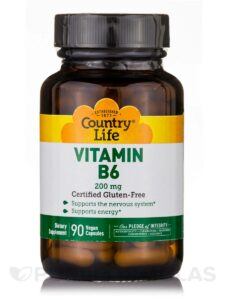 chemicals. It powers brain processes and development, steroid hormone activity, and immune function.
chemicals. It powers brain processes and development, steroid hormone activity, and immune function.
Pyridoxine deficiency – Pyridoxine deficiency is rare. Individuals who drink extreme amounts of alcohol, women (especially those on the contraceptive pill), the elderly, and individuals with thyroid disease are the most at risk.
Excessive Pyridoxine intake can lead to Pyridoxine toxicity and is mostly due to supplementation, which can lead to injurious levels in the body that can damage the nerves.
Biotin (B7) – Biotin is required for fat synthesis, energy metabolism, amino acid metabolism, and glycogen synthesis. High biotin intake can contribute to increased blood cholesterol levels.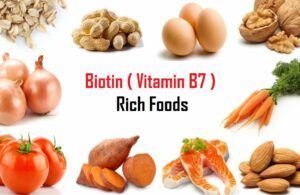
Biotin deficiency – Biotin shortage is extremely rare – it is widely dispersed in foods and only required in minute amounts. However, over-consumption of raw egg whites over a period of several months could generate deficiency because a protein in the egg white inhibits biotin absorption.
Folate or folic acid (B9) – Folate or folic acid (the synthetic form of folate) which is used broadly in dietary supplements and food fortification) is necessary to form red blood cells that carry oxygen around the body. It helps the growth of the foetal nervous system, as well as DNA synthesis and cell growth. Females of childbearing age require a diet rich in folate for this 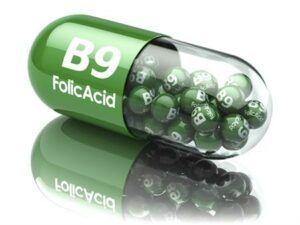 very reason.
very reason.
If planning a pregnancy or in the first trimester of pregnancy, an individual should visit their doctor to make sure they are getting enough folate. This is essential to reduce the risks of neural tube defects such as spinal bifida in the child.
Although folic acid is generally considered to be non-toxic, excessive intakes above 1,000 mcg per day over a long period can lead to irritability, depression, and, intestinal dysfunction. The main risk with excessive folate intake is that it can mask a vitamin B12 deficiency, so it’s best to consume these two vitamins within the recommended amounts. B12 is next.
Cyanocobalamin (B12) – Last but not least, Cyanocobalamin aids in constructing and maintaining the myelin surrounding nerve cells, mental ability, red blood cell formation, and the breaking down of some fatty acids and amino acids to produce energy. Vitamin B12 has an intimate 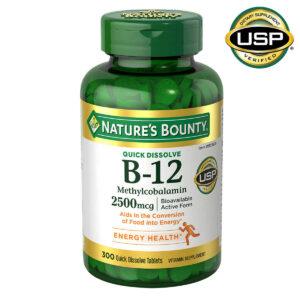 relationship with folate, as they both depend on the other to function properly.
relationship with folate, as they both depend on the other to function properly.
Vitamin B12 deficiency – Because vitamin B12 is exclusively found in foods from animal sources, people following strict vegan diets, and also breastfed babies of vegan mothers, tend to be most commonly affected.
Absorption of B12 from the gut also tends to decrease with age; therefore, the elderly are another group of the population who are more in danger of deficiency.
Although each one of these vitamins has unique functions, they collectively help the body generate energy and make important molecules within the cells.
Where to Find B Vitamins
Foods
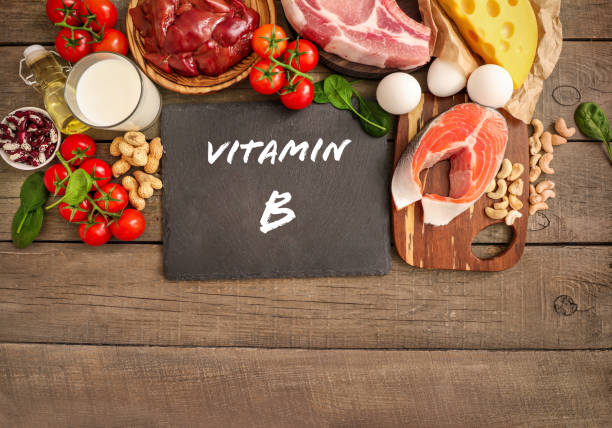
With the exception of B12, the body cannot store B vitamins for long periods, so we need to replenish them regularly through food.
A host of foods provides B vitamins; however, to be considered high in a specific vitamin, a food must have a minimum of 20% of the Reference Daily Intake (RDI) per serving. Alternatively, a food that contains 10–19% of the RDI is well-thought-out to be a good source.
Below are some healthy foods high in one or more B vitamins.
Salmon – This highly nutritious fish is high in several B vitamins. Also, salmon is known to be a low-mercury fish that’s additionally high in beneficial omega-3 fats, and also in protein and selenium.
Salmon is rich in riboflavin, niacin, B6, and B12, as well as a great source of thiamine and pantothenic acid.
Leafy Greens – A number of leafy greens stand out for their folate (B9) content. These are among the very best vegetable sources of folate. They include Spinach (raw and cooked), collards, and turnip greens, romaine lettuce (raw).
It is important to mention that some folate is eliminated by heat during the cooking process, and quantity can be transferred to the cooking water also. Therefore, to reduce folate loss during cooking, it’s best to steam the greens until partway between tender and crisp.
Liver and Other Organ Meats
– Though not especially popular, organ meats — especially liver — are packed full with B vitamins. This is true whether they are from beef, pork, lamb, or chicken.
Eggs – One large egg contains 33% of the RDI for biotin spread between the yolk and white. Eggs are one among the highest sources of biotin —the liver only contains more.
Eggs additionally have smaller amounts of other B vitamins. One large (50-gram) cooked egg contains Riboflavin (B2): 15% of the RDI, Pantothenic acid (B5): 7% of the RDI, Biotin (B7): 33% of the RDI, Folate (B9): 5% of the RDI, Cobalamin (B12): 9% of the RDI.
For individuals who don’t eat eggs, meat, or other animal products, they can meet their biotin needs by consuming foods like vegetables, fruits, nuts, seeds, and whole grains, which all contain small quantities of biotin.
Milk – One 8-ounce cup (240 ml) of milk provides 26% of the RDI for riboflavin, as well as smaller amounts of other B vitamins.
As with other animal foods, milk also is a very good source of B12, supplying 18% of the RDI per 1-cup (240-ml) serving.
Beef – Beef can make a big contribution to our B vitamin intake. Beef contains high amounts of B3, B6, and B12. A 3.5-ounce (100-gram) serving supplies about a third of the RDI for each of these vitamins, in addition to smaller amounts of other B vitamins.
Oysters, Clams, and Mussels – Oysters, clams, and mussels are an all-star source of B12 and an excellent source of riboflavin. They additionally supply smaller amounts of thiamine, niacin, and folate.
These shellfish are additionally rich in protein and several minerals, including iron, zinc, selenium, and manganese. They are also a good source of omega-3 fats as well.
Legumes – Legumes (beans) are most notable for their high folate content. They additionally provide small amounts of other B vitamins, including thiamine, riboflavin, niacin, pantothenic acid and, B6. For pregnant women, folate is a B vitamin that is important for reducing the risk of certain birth defects. This is true of most legumes such as pinto beans, black beans, and lentils.
Other legumes include chickpeas, edamame, (green soybeans), green peas, kidney beans, roasted soy nuts.
There is a synthetic form of folate called folic acid.
Chicken and Turkey (fowl) – Chicken and turkey are most noteworthy for their niacin and pyridoxine content. White meat — like the breast — supplies more of those two vitamins than darker meat — like the thigh.
It is important to mention that the majority of the B vitamins are within the meat, not the skin.
Yogurt – Yogurt is known for its riboflavin and B12 content. Though nutrition varies by brand, a serving of yogurt
averages a substantial amount of these valuable nutrients but non-dairy yogurt alternatives aren’t good sources of these vitamins unless they’re fortified. It is advisable to limit the intake of sugar-sweetened yogurt as they contain 3–4 teaspoons of added sugars per 2/3-cup serving.
Nutritional and Brewer’s Yeast – Nutritional yeast and brewer’s yeast are inactive, meaning they cannot be used to make bread. Rather, they are used to boost the flavor and nutrient profile of products.
These yeasts naturally have B vitamins and are frequently fortified with them as well, particularly nutritional yeast. If nutrients are added, they are listed in the ingredients on the label.
Vegetarians and vegans generally use nutritional yeast, because it is fortified with B12, which is difficult to obtain if an individual doesn’t consume animal products.
Pork – Like other common meats, pork is packed full of several B vitamins. It is particularly known for its high amount of thiamine, of which beef contains little.
In order for pork to be a healthy choice, it is best to choose loin cuts that are much lower in fat and calories than shoulder cuts, spareribs, and bacon.
Trout – Trout is a freshwater fish that is closely related to salmon and is high in several B vitamins. Trout is high in thiamine, riboflavin, niacin, pantothenic acid, and vitamin B12.
Also, trout is an excellent source of protein, rich in omega-3 fats and low in mercury.
Sunflower Seeds – Sunflower seeds are one of the best plant resources of pantothenic acid. This B vitamin got its name from the Greek word “pantos,” which means “everywhere.” This is because it is found in most plant and animal foods but usually only in small amounts.
Surprisingly, 1 ounce (28 grams) of sunflower seeds carries 20% of the RDI for pantothenic acid. Sunflower seeds are additionally a good source of niacin, folate, and B6.
Sunflower seed butter, common among individuals with nut allergies, is a superior source of pantothenic acid also.
Supplementation
For those who are unable to maintain a healthy diet for one reason or another, they can go the supplementation route. Supplements are a 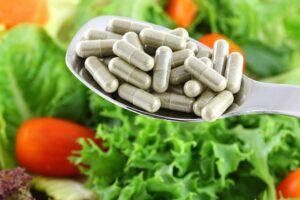 convenient way to ensure an individual that they are taking in an ample supply of nutrition, including B vitamins.
convenient way to ensure an individual that they are taking in an ample supply of nutrition, including B vitamins.
To see what is available at a reputable online vitamin source, you may click here.
Vitamin B Deficiencies and Symptoms
For overall good health, which includes a sound mind and body, B vitamins play a crucial role.
Vitamin B1
deficiency is unusual, and also vitamin B2 deficiency is very unusual, in the United States.
This is because many foods, such as milk and whole-grain cereals, are equipped with these vitamins.
It can however become an issue with individuals that misuse alcohol, presenting symptoms such as confusion and cracks along the sides of the 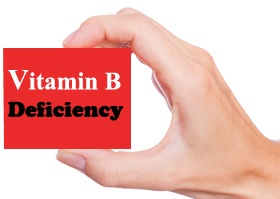 mouth.
mouth.
Vitamin B3 (niacin) deficiency is very unusual in the United States. A lack of niacin can cause digestive issues, such as nausea and abdominal cramps. Severe deficiency may also cause mental confusion.
Severe deficiency can result in a condition called pellagra, with symptoms such as:
- a bright red tongue
- aggressive, paranoid, or suicidal behavior
- constipation or diarrhea
- fatigue
- hallucinations
- skin that is rough and turns red or brown in the sun
- vomiting
Vitamin B6 shortage of this key B vitamin can be the cause for an individual to experience flaky, oily rashes on their upper body or face.
Vitamin B9 (folic-folic acid) deficiency is unusual in the United States, but it does appear.
Low levels of vitamin B9 can result in the following symptoms:
- changes in skin, hair, or fingernail color
- fatigue
- headache
- heart palpitations
- irritability
- megaloblastic anemia, that causes weakness
- open sores in the mouth
- shortness of breath
- trouble concentrating
Pregnant females with a B9 deficiency could result in their infants being born with neural tube defects.
However, excessive supplemental folic acid during pregnancy may lead to an infant developing neurological problems.
Vitamin B12 deficiency can lead to disruption in the nervous and circulatory systems.
Additionally, deficiencies can lead to megaloblastic anemia, a condition where the bone marrow generates large abnormally shaped red blood cells that do not work properly.
Psychological conditions such as dementia, paranoia, depression, and behavioral changes can result from a vitamin B12 deficiency. Neurological damage sometimes cannot be reversed.
Vitamin B12 deficiency can cause the following symptoms:
- balance problems
- confusion
- constipation
- loss of appetite
- numbness and tingling within the hands and feet
- poor memory
- soreness of the mouth or tongue
- tiredness or fatigue
- weakness
- weight loss
Vitamin B12 deficiencies affect between 1.5 and 15% of the population in America.
The B vitamins play a crucial role in our health and quality of life. Therefore it behooves us to be sure we are consuming ample amounts this and all of the necessary vitamins and minerals from both food and supplements.
For more information on supplements, see the article, Dietary Supplements: The Facts on this website.
Feel free to leave any questions, comments and concerns below.
Good health!!
It isn’t nothing new hearing about Vitamin B. It is essential for so many things and for you to maintain a healthy lifestyle. It is good to see an article explaining more about Vitamin B. I believe it is important that we learn about what our bodies need to remain healthy and strong. I train dogs and I feel just the same about dogs. It is important that we learn about vitamins and minerals that keep them healthy and strong.
Absolutely Castle! It is so important for us to seek what out bodies need to stay healthy. We must be proactive with our health instead of reactive. Yes It does apply to dogs as well so we can enjoy them as long as possible.
Thanks for commenting